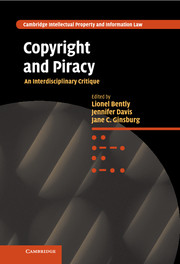Book contents
- Frontmatter
- Contents
- Notes on the contributors
- Editors' preface
- Table of cases
- Table of statutes
- Part I Introduction
- Part II History
- Part III Comparative Law
- Part IV Economics
- Part V Linguistics
- 8 ‘Substantial similarity of expression’ in copyright infringement actions: a linguistic perspective
- 9 Refining notions of idea and expression through linguistic analysis
- Part VI Computer software
- Part VII Information studies
- Part VIII Literature
- Part IX Art
- Part X Sociology/music
- Part XI Criminology
- Bibliography
- Index
9 - Refining notions of idea and expression through linguistic analysis
from Part V - Linguistics
Published online by Cambridge University Press: 17 November 2010
- Frontmatter
- Contents
- Notes on the contributors
- Editors' preface
- Table of cases
- Table of statutes
- Part I Introduction
- Part II History
- Part III Comparative Law
- Part IV Economics
- Part V Linguistics
- 8 ‘Substantial similarity of expression’ in copyright infringement actions: a linguistic perspective
- 9 Refining notions of idea and expression through linguistic analysis
- Part VI Computer software
- Part VII Information studies
- Part VIII Literature
- Part IX Art
- Part X Sociology/music
- Part XI Criminology
- Bibliography
- Index
Summary
Introduction
The distinction between unprotectable ideas and copyrighted expression is one of the most fundamental principles of copyright law. It is a ubiquitous principle of national copyright law, and may even be the international ceiling on the subject matter capable of protection under national law. But no principle has been so frequently repeated and yet so badly understood. Indeed, commentators and courts have not been slow to comment on how difficult it is to grasp the distinction between idea and expression – or, perhaps more accurately, how difficult it is to articulate the distinction, or to draw it in practice.
Some of the most intractable problems in applying the distinction (and hence of making overall determinations of infringement) have arisen in the context of applying copyright law to new technologies. Protection of software, in particular, has generated difficult decisions for courts seeking to sustain and apply the distinction. This is in part because computer programs ‘hover more closely to the elusive boundary line between idea and expression’ and hence repeatedly test the resilience of the distinction. Likewise, musical copyright cases, even more so of late, have presented courts with similarly hard questions (possibly because of a felt lack of judicial expertise, and perhaps also with an eye to the ‘functional’ aspects of certain parts of the musical work). In both types of cases, courts as a result appear more comfortable with an expansive role for expert testimony to aid judicial resolution of the dispute.
- Type
- Chapter
- Information
- Copyright and PiracyAn Interdisciplinary Critique, pp. 194 - 206Publisher: Cambridge University PressPrint publication year: 2010



